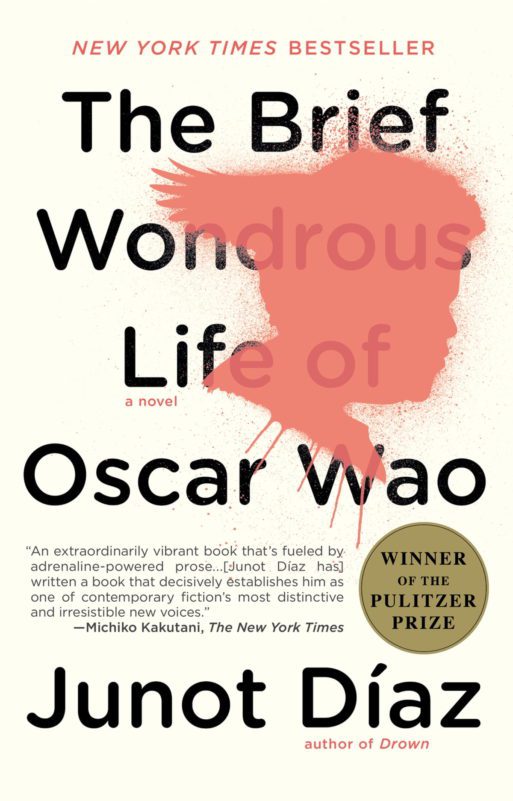 ***This post contains spoilers***
***This post contains spoilers***
As its title suggests, The Brief Wondrous Life of Oscar Wao tells the life story of a young individual, up until his death. In fact, Junot Diaz‘s 2007 novel contains many deaths, but I’m going to examine specifically those of Oscar and his mother, near the end of the book. Oscar, whose real last name is de Leon (“Wao” is a nickname bestowed upon him by a friend-of-a-friend, who mistakes his Halloween costume for Oscar Wilde), is a science fiction-obsessed teenager who seeks to find true love. The novel takes us through his various failed attempts at romance, until finally, he meets an older woman named Ybon Pimentel in the Dominican Republic and falls in love with her. The problem is, Ybon has a violent boyfriend (nicknamed “the capitan”), and when he finds out about Oscar, it leads to Oscar’s downfall. The capitan and his friends beat Oscar up, but this doesn’t stop Oscar. After spending some time recovering at home in New Jersey, he returns to the Dominican Republic, this time, forced to face his death.
Two of the capitan’s friends, “Gorilla Grod” and “Solomon Grundy,” see Oscar one night and take him to a canefield, where they hold him at gunpoint. In the face of their guns, Oscar makes a final, moving speech about love, and about the afterlife: “…over there he’d be a hero, an avenger. Because anything you can dream (he put his hand up) you can be” (Diaz 321-22). Even more powerful are the lines that describe Oscar’s last words, prompted by his captors: “…Listen, we’ll let you go if you tell us what fuego means in English. Fire, he blurted out, unable to help himself” (Diaz 322). But most striking is the narrator Yunior’s loss for words at this point; separated from these last few lines by a space, he writes merely, “Oscar–” (Diaz 322). This absence of language conveys more emotion than any words could.
The language that comes in the next chapter continues to be sparse, with Yunior summing up the next two years in just a few lines: “That’s pretty much it. We flew down to claim the body. We arranged the funeral. No one there but us, not even Al and Miggs [Oscar’s friends]. Lola [Oscar’s sister] crying and crying. A year later their mother’s cancer returned and this time it dug in and stayed. I visited her in the hospital with Lola. Six times in all. She would live for another ten months, but by then she’d more or less given up. I did all I could” (Diaz 323). Oftentimes authors utilize dense, descriptive diction to express characters’ pain, but I think the conciseness here is just as poignant; the reader can tell Yunior is hurting without him having to say so. This brevity when communicating about death crops up again when Yunior says of Oscar’s mother, “They buried her next to her son, and Lola read a poem she had written, and that was it. Ashes to ashes, dust to dust” (Diaz 323). The simplicity of these sentences, as well as the use of the common expression “Ashes to ashes,” alludes to how natural, how basic, death is. As unique as each death may be, dying is something that everyone experiences. We all go become part of nature in the end.
This isn’t something that Yunior easily grasps, however. Even the form of Diaz’s novel can be viewed as a reluctance to come to terms with death, with endings. Just a few of the titles of the book’s last sections are, “The Final Voyage,” “The Last Days of Oscar Wao,” “The End of the Story,” and “On a Super Final Note”; yet even this last one doesn’t mark the ending of the novel. It continues for another 10 pages, another few sections, before it finally concludes. The narrator is very conscious of his prolonging of the book. At one point, he writes, “It’s almost done. Almost over. Only some final things to show you…” (Diaz 329). But although the subject may frighten Yunior, it didn’t scare Oscar. Near the very end of the book, Yunior mentions looking through Oscar’s copy of Watchmen and seeing a panel circled: “After the mutant brain has destroyed New York City; after Dr. Manhattan has murdered Rorschach; after Veidt’s plan has succeeded in ‘saving the world.’ Veidt says: ‘I did the right thing, didn’t I? It all worked out in the end.’ And Manhattan, before fading from our Universe, replies: ‘In the end? Nothing ends, Adrian. Nothing ever ends’” (Diaz 331). We may all become ashes, or dust, but this doesn’t have to signify an ending. As the novel shows, memories sustain the people we love, so that their presence in our lives is never lost.
For an interview with Junot Diaz about the novel, click here.

 “The Brief Wondrous Life of Oscar Wao” by Junot Diaz
“The Brief Wondrous Life of Oscar Wao” by Junot Diaz


 Funeral Home Owner Chris Johnson Spending Halloween in Jail
Funeral Home Owner Chris Johnson Spending Halloween in Jail
 Our Monthly Tip: Toast a Loved One with a Personalized Glass
Our Monthly Tip: Toast a Loved One with a Personalized Glass
 My Cousin’s Death Taught Me the Meaning of Life
My Cousin’s Death Taught Me the Meaning of Life














